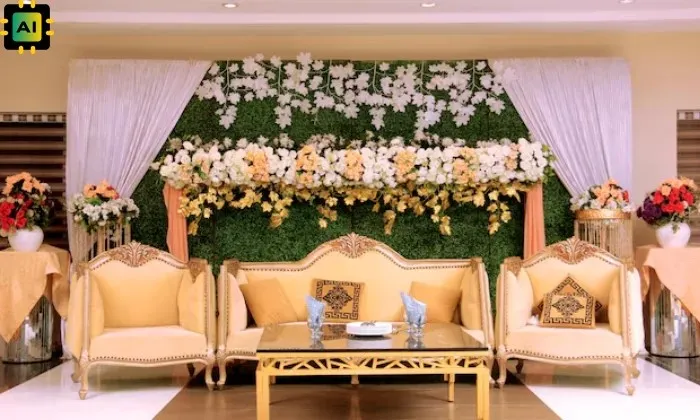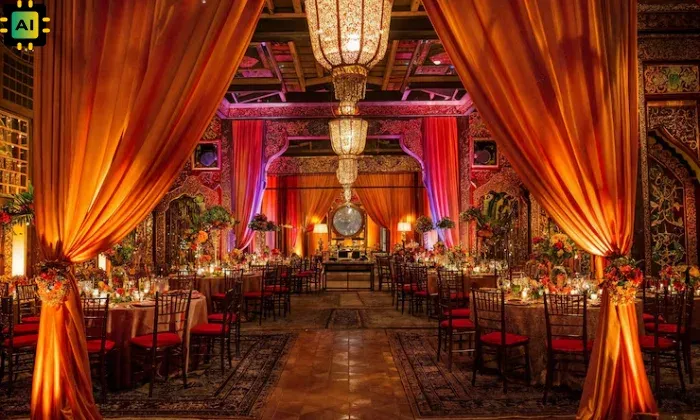Traditional Hindu Wedding Rituals Explained
 Wedding Trends
Wedding TrendsTraditional Hindu Wedding
Rituals Explained: A Sacred Journey of Love, Culture, and Spirituality
Marriage in Hindu culture
is not just an association of two individuals - it is a deep spiritual and
social function that units two families, local communities and souls.
Traditional Hindu marriage is one of the most colorful, symbolic and rich
ceremonies in the world. It combines the celebration of history, tradition,
spirituality and happiness in a fantastic program that can last for several
days.
🌸 What are Hindu wedding
rituals?
Hindu wit is a series of
religious and cultural rituals that mark the Holy Association of two
individuals. These rituals are based on wood traditions, which have been
together for thousands of years. They call on the gods, sing mantras and make
symbolic functions such as publishing the Holy Fire, Exchange of Wreaths and
taking mortgages (Saptapadi or seven steps).
Each ritual means, links
the couple to the cosmic principles of religion (duty), which means
(prosperity), work (love) and salvation (spiritual liberation).
🕉 Historical meaning of
Hindu wedding
Hindu marriages discover
their origin for the Vedas (ancient scriptures), where marriage was seen as a
rite (rite) and a great duty in one life. The goal was not just camaraderie,
but:
Family descent continuity
Spiritual development of
both partners
Social balance and
harmony
Over time, rituals
evolved with cultural influences from different regions of India, but the
essence of purity and symbolism has retained.
🌺 Why are Hindu wedding
rituals necessary?
Rituals act as a pair,
their families and society's responsibilities as a sacred affirmation. They
need due to the fact:
They sanctify the union
beyond a prison or emotional tape.
They require divine
advantages for prosperity, health and happiness.
They maintain cultural
identity via preserving alive ancient traditions alive.
They strengthen the
circle of relatives bands as a marriage are collective social applications.
Without those rituals, a
wedding can sense incomplete to many families that provide extra significance
to the tradition of modern love.
🌿 Large Hindu wedding
rituals defined
Here, the maximum not
unusual rituals in Hindu wedding have a step -b -level look (despite the fact
that the practices are distinctive from the sector):
1. Ganesh Puja (ask for
benefits)
Marriage starts
offevolved by scary Lord Ganesha, who eliminates limitations, and ensures that
the ceremony movements easily.
2. Kanyadaan (elimination
of bride)
One of the maximum
emotional rituals, the bride's father passed his daughter to the groom, which
symbolizes the circle of relatives's agree with and fusion.
3. Jayamla (Exchange of
Mala)
The groom and the bride
and a flower wreath as a signal of mutual popularity and love.
4. Mangalasutra and
Sindoor (Holy Symbol of Marriage)
The groom makes use of a
mangalsutra (necklace of joy) around the bride's neck and makes use of
Vermilian (Vermilian) on her forehead - a symbol of her married nation.
5. Havan and Agni Puja
(Holy Fire Ritual)
The couple sits in the
front of the Holy Agni (Agni) and pray for the divine advantages of their
promise, eternal witnesses.
6. Sapapadi (seven
levels)
The most essential ritual
- where the couple takes seven steps across the Holy Fire, represents each
step, which represents the promise of camaraderie, prosperity, family and non
secular harmony.
7. Blessing (blessing)
The oldest showered
blessings to the newlyweds, which symbolize genetic continuity.
🌼 The importance of Hindu
wedding rituals
The meaning of these
rituals lies in their spiritual, cultural and emotional significance:
They associate modern
couples with ancient knowledge.
They remind them of their
mutual duties and respect.
They strengthen the
relationship between families and communities.
They celebrate love with
greatness, happiness and affection.
Pros:
Cultural protection:
Keeps old traditions alive.
Spiritual depth: Makes
meaning beyond physical function.
Family participation:
Strengthens conditions and social conditions.
Symbolism: Each action
has a sacred meaning.
Cons:
High and expensive: Multi
-day features can be financially heavy.
Complexity: All rituals
are not understood by young generations.
Regional variations: Can
cause confusion in inter-content weddings.
Press: Social
expectations can supervise personal preferences.
🌏 Modern adaptation of
Hindu wedding
While tradition remains
central, modern pairs of rituals optimize to balance spirituality with
practical:
Environmentally friendly
weddings are hosted.
To simplify the rituals
for a day's events.
Conventional customs with
contemporary subjects.
Educate guests with
booklets or digital guides about rituals.
🔑 Keywords for Hindu
wedding rituals
Traditional Hindu
marriage, Indian wedding traditions, Hindu wedding rituals, Sapapadi Lift,
Kanyadan Rituals, Mangalsutra ceremony, Sindhor Application, Agni Puja, Hindu
Marriage Customs, Reeti -reevaz, Indian Cultural Wedding.
FAQ
1. How lengthy does a
conventional Hindu will final?
It can stay for two-7
days, which relies upon at the wide variety of rituals executed.
2. What is the most vital
ritual of a Hindu wedding?
Saptapadi (seven steps
round the fire) is taken into consideration the sacred.
3. Why is fire utilized
in Hindu weddings?
Agni (Agni) is a divine
witness, that is a symbol of purity and everlasting fact.
4. What is the cause of
Kanyadan?
It is a symbol of leaving
the bride's mother and father to his daughter with blessings.
5. Can Interfeath -couple
have Hindu rituals?
Yes, despite the fact
that rituals may be adapted with the consent of households and monks.
6. What is the function
of astrology in Hindu marriage?
Astrology is regularly
used to in shape the horoscope for compatibility.
7. Why is Mangalsutra
critical?
It is a sacred thread
that represents love, willpower and safety.
8. Are all Hindu weddings
the identical?
No -valuation is
exceptional on the idea of fields (North Indian, South Indian, Bengali,
Gujarati, and so forth.).
9. Does all Hindu wedding
require a clergyman?
Traditionally yes,
however a few present day couples pick simplified or symbolic feature.
10. Can Hindu wedding
ceremony be modernized?
Yes, many couples mix
traditions with current themes, environmentally aware layouts and minimalism.
Blog Category
Popular Blogs
-min.webp)
Top Bridal Entry Ideas: Unique and Memorable Ways for Indian Brides
5 Jul, 2024

10 Unique Couple Outfit Colors for Sangeet Ceremony
2 Aug, 2025

Marriage Home in Alwar: Dream Wedding Hub
4 Nov, 2025

Harmonies of Love Top Trending Wedding Songs in 2025
9 Oct, 2025
.webp)
Best Wedding Venues in Alwar : Dream Wedding Hub
25 Oct, 2025

Best Wedding Venues In neemrana (alwar)
31 Oct, 2025
.webp)
Best Wedding Venues in Rajgarh : Dream Wedding Hub
31 Oct, 2025

Wedding Venue in Malviya Nagar (Jaipur): Dream Wedding Hub
23 Oct, 2025

Wedding Venue in Bassi (Jaipur) : Dream Wedding Hub
23 Oct, 2025
 (1).webp)
Best Wedding Venues in Alwar
25 Oct, 2025